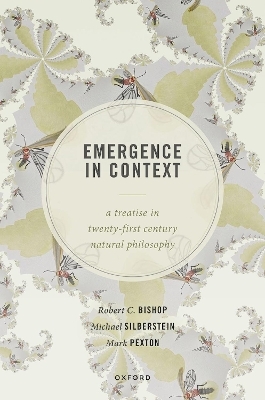
Emergence in Context
Oxford University Press (Verlag)
978-0-19-284978-6 (ISBN)
Contextual emergence is grounded primarily in the sciences as opposed to logic or metaphysics. It is both an explanatory and ontological account of emergence that gets beyond the impasse between “weak” and “strong” emergence in the emergence debates. It challenges the “foundationalist” or hierarchical picture of reality and emphasizes the ontological and explanatory fundamentality of multiscale stability conditions and their contextual constraints, often operating globally over interconnected, interdependent, and interacting entities and their multiscale relations. It also focuses on the conditions that make the existence, stability, and persistence of emergent systems and their states and observables possible. These conditions and constraints are irreducibly multiscale relations, so it is not surprising that scientific explanation is often multiscale. Such multiscale conditions act as gatekeepers for systems to access modal possibilities (e.g., reducing or enhancing a system's degrees of freedom).
Using examples from across the sciences, ranging from physics to biology to neuroscience and beyond, this book demonstrates that there is an empirically well-grounded, viable alternative to ontological reductionism coupled with explanatory anti-reductionism (weak emergence) and ontological disunity coupled with the impossibility of robust scientific explanation (strong emergence). Central metaphysics of science concerns are also addressed.
Emergence in Context: A Treatise in Twenty-First Century Natural Philosophy is written primarily for philosophers of science, but also professional scientists from multiple disciplines who are interested in emergence and particularly in the metaphysics of science.
Robert C. Bishop is the John and Madeleine McIntyre Endowed Professor of Philosophy and History of Science at Wheaton College. His primary research interests are in the history and philosophy of physics, biology, and the social sciences as well as free will. He explores reduction, emergence, and determinism in these areas. He is the author of The Philosophy of the Social Sciences (2007) and The Physics of Emergence (2019). Michael Silberstein is Professor of Philosophy at Elizabethtown College and the Director of the Cognitive Science Program, Core Neuroscience Faculty member, and Affiliated Faculty in the Philosophy Department at the University of Maryland, College Park. His primary research interests are foundations of physics and foundations of cognitive science, respectively. He is also interested in how these branches of philosophy and science bear on more general questions of reduction, emergence, and explanation. His most recent book is Beyond the Dynamical Universe: Unifying Block Universe Physics and Time as Experienced (OUP, 2018). Mark Pexton is an independent philosopher of science specialising in interdisciplinary work. His research areas include: the philosophy of condensed matter physics, causal and non-causal explanations, philosophy of astrophysics, and the science and metaphysics of emergence.
Preface
1: Introduction
2: Contextual Emergence
3: Intertheoretic Relations and Multiscale Modeling
4: Classical and Quantum Physics
5: Contextual Emergence in Condensed Matter Physics
6: Contextual Emergence in Biology and Neuroscience
7: Ontological and Scientific Implications of Contextual Emergence
| Erscheinungsdatum | 21.07.2022 |
|---|---|
| Zusatzinfo | 7 colour line figures |
| Verlagsort | Oxford |
| Sprache | englisch |
| Maße | 64 x 95 mm |
| Gewicht | 802 g |
| Themenwelt | Geisteswissenschaften ► Philosophie ► Allgemeines / Lexika |
| Geisteswissenschaften ► Philosophie ► Metaphysik / Ontologie | |
| Naturwissenschaften ► Physik / Astronomie ► Relativitätstheorie | |
| ISBN-10 | 0-19-284978-6 / 0192849786 |
| ISBN-13 | 978-0-19-284978-6 / 9780192849786 |
| Zustand | Neuware |
| Haben Sie eine Frage zum Produkt? |
aus dem Bereich


